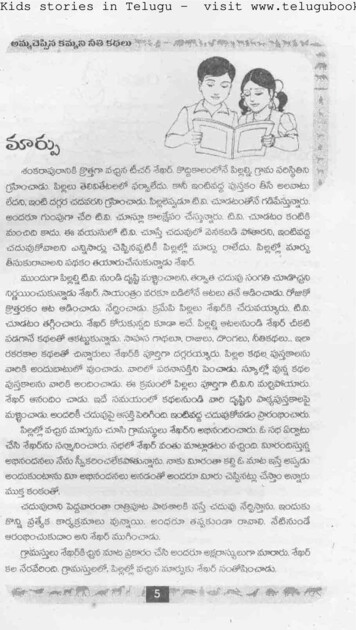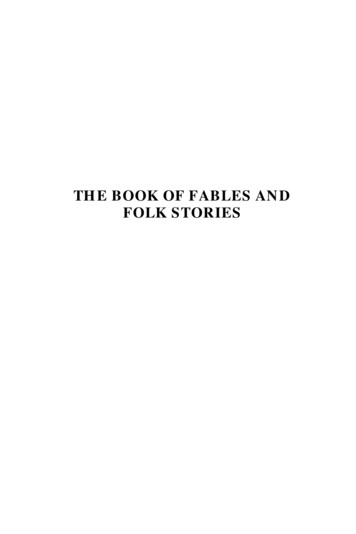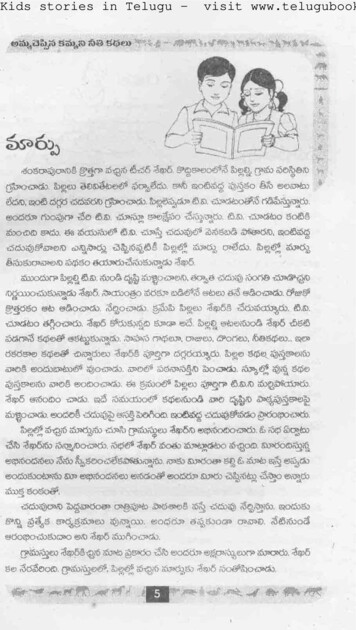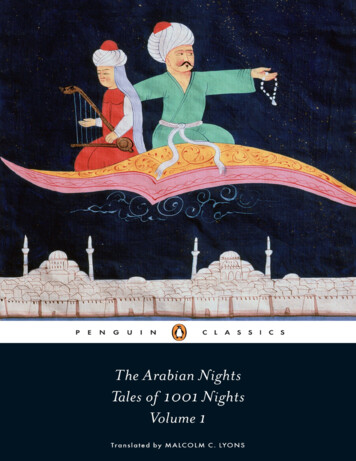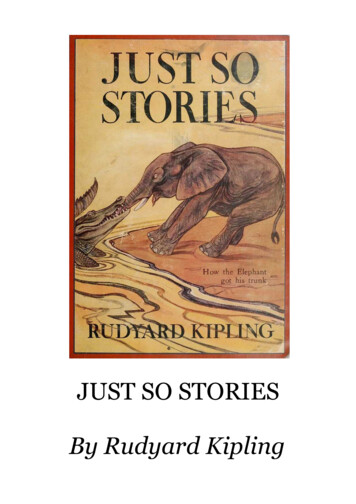
Transcription
JUST SO STORIESBy Rudyard Kipling
This book is in the public domain.The content is available to be shared without restriction.This version was brought to you by Free Kids Books, agrowing library of original and public domain books,brought to you entirely free for the joy of reading.Many more books like thisone are availableonline and for free download at:http://www.freekidsbooks.orgContact the site manager at:danielle@redskyventures.orgJoin our Facebook page orlife
Table of ContentsHOW THE WHALE GOT HIS THROAT.4HOW THE CAMEL GOT HIS HUMP.7HOW THE RHINOCEROS GOT HIS SKIN.11HOW THE LEOPARD GOT HIS SPOTS.14THE ELEPHANT'S CHILD.19THE SING-SONG OF OLD MAN KANGAROO.25THE BEGINNING OF THE ARMADILLOS.29HOW THE FIRST LETTER WAS WRITTEN.36HOW THE ALPHABET WAS MADE.43THE CRAB THAT PLAYED WITH THE SEA.51THE CAT THAT WALKED BY HIMSELF.58THE BUTTERFLY THAT STAMPED.66FREE KIDS BOOKS .73
HOW THE WHALE GOT HIS THROATIN the sea, once upon a time, O my Best Beloved, there was a Whale, and he atefishes. He ate the starfish and the garfish, and the crab and the dab, and the plaiceand the dace, and the skate and his mate, and the mackereel and the pickereel, andthe really truly twirly-whirly eel. All the fishes he could find in all the sea he atewith his mouth--so! Till at last there was only one small fish left in all the sea, andhe was a small 'Stute Fish, and he swam a little behind the Whale's right ear, so asto be out of harm's way. Then the Whale stood up on his tail and said, 'I'm hungry.'And the small 'Stute Fish said in a small 'stute voice, 'Noble and generous Cetacean,have you ever tasted Man?''No,' said the Whale. 'What is it like?''Nice,' said the small 'Stute Fish. 'Nice but nubbly.''Then fetch me some,' said the Whale, and he made the sea froth up with his tail.'One at a time is enough,' said the 'Stute Fish. 'If you swim to latitude Fifty North,longitude Forty West (that is magic), you will find, sitting on a raft, in themiddle of the sea, with nothing on but a pair of blue canvas breeches, a pair ofsuspenders (you must not forget the suspenders, Best Beloved), and a jack-knife,one ship-wrecked Mariner, who, it is only fair to tell you, is a man of infiniteresource-and-sagacity.'So the Whale swam and swam to latitude Fifty North, longitude Forty West, as fastas he could swim, and on a raft, in the middle of the sea, with nothing towear except a pair of blue canvas breeches, a pair of suspenders (you mustparticularly remember the suspenders, Best Beloved), and a jack-knife, he foundone single, solitary shipwrecked Mariner, trailing his toes in the water. (He had hismummy's leave to paddle, or else he would never have done it, because he was aman of infinite-resource-and-sagacity.)Then the Whale opened his mouth back and back and back till it nearly touched histail, and he swallowed the shipwrecked Mariner, and the raft he was sitting on, andhis blue canvas breeches, and the suspenders (which you must not forget),and the jack-knife--He swallowed them all down into his warm, dark, insidecup-boards, and then he smacked his lips--so, and turned round three times on histail.But as soon as the Mariner, who was a man of infinite-resource-and-sagacity, foundhimself truly inside the Whale's warm, dark, inside cup-boards, he stumped and hejumped and he thumped and he bumped, and he pranced and he danced, and hebanged and he clanged, and he hit and he bit, and he leaped and he creeped, and heprowled and he howled, and he hopped and he dropped, and he cried and hesighed, and he crawled and he bawled, and he stepped and he lepped, and hedanced hornpipes where he shouldn't, and the Whale felt most unhappy indeed.( Have you forgotten the suspenders?)So he said to the 'Stute Fish, 'This man is very nubbly, and besides he is making mehiccough. What shall I do?''Tell him to come out,' said the 'Stute Fish.So the Whale called down his own throat to the shipwrecked Mariner,'Come out and behave yourself. I've got the hiccoughs.''Nay, nay!' said the Mariner. 'Not so, but far otherwise. Take me to my natal-shoreand the white-cliffs-of-Albion, and I'll think about it.''And he began to dance more than ever.
'You had better take him home,' said the 'Stute Fish to the Whale.'I ought to have warned you that he is a man of infinite-resource-and-sagacity.'So the Whale swam and swam and swam, with both flippers and his tail, as hard ashe could for the hiccoughs; and at last he saw the Mariner's natal-shore and thewhite-cliffs-of-Albion, and he rushed half-way up the beach, and opened his mouthwide and wide and wide, and said, 'Change here for Winchester, Ashuelot, Nashua,Keene, and stations on the Fitch burg Road;' and just as he said 'Fitch' theMariner walked out of his mouth. But while the Whale had been swimming, theMariner, who was indeed a person of infinite-resource-and-sagacity, had taken hisjack-knife and cut up the raft into a little square grating all running criss-cross, andhe had tied it firm with his suspenders ( now , you know why you were not toforget the suspenders!), and he dragged that grating good and tight into theWhale's throat, and there it stuck! Then he recited the following Sloka , which, asyou have not heard it, I will now proceed to relate-By means of a gratingI have stopped your 'ating.For the Mariner he was also an Hi-ber-ni-an. And he stepped out on the shingle,and went home to his mother, who had given him leave to trail his toes in thewater; and he married and lived happily ever afterward. So did the Whale. But fromthat day on, the grating in his throat, which he could neither cough up nor swallowdown, prevented him eating anything except very, very small fish; and that is thereason why whales nowadays never eat men or boys or little girls.The small 'Stute Fish went and hid himself in the mud under the Door-sills of theEquator. He was afraid that the Whale might be angry with him.The Sailor took the jack-knife home. He was wearing the blue canvas breecheswhen he walked out on the shingle. The suspenders were left behind, you see, to tiethe grating with; and that is the end of that tale.WHEN the cabin port-holes are dark and greenBecause of the seas outside;When the ship goes wop (with a wiggle between)And the steward falls into the soup-tureen,And the trunks begin to slide;When Nursey lies on the floor in a heap,And Mummy tells you to let her sleep,And you aren't waked or washed or dressed,Why, then you will know (if you haven't guessed)You're 'Fifty North and Forty West!'
HOW THE CAMEL GOT HIS HUMPNOW this is the next tale, and it tells how the Camel got his big hump.In the beginning of years, when the world was so new and all, and theAnimals were just beginning to work for Man, there was a Camel, and helived in the middle of a Howling Desert because he did not want to work;and besides, he was a Howler himself. So he ate sticks and thorns andtamarisks and milkweed and prickles, most 'scruciating idle; and whenanybody spoke to him he said 'Humph!' Just 'Humph!' and no more.Presently the Horse came to him on Monday morning, with a saddle on hisback and a bit in his mouth, and said, 'Camel, O Camel, come out andtrot like the rest of us.''Humph!' said the Camel; and the Horse went away and told the Man.Presently the Dog came to him, with a stick in his mouth, and said,'Camel, O Camel, come and fetch and carry like the rest of us.''Humph!' said the Camel; and the Dog went away and told the Man.Presently the Ox came to him, with the yoke on his neck and said,'Camel, O Camel, come and plough like the rest of us.''Humph!' said the Camel; and the Ox went away and told the Man.At the end of the day the Man called the Horse and the Dog and the Oxtogether, and said, 'Three, O Three, I'm very sorry for you (with theworld so new-and-all); but that Humph-thing in the Desert can't work,or he would have been here by now, so I am going to leave him alone, andyou must work double-time to make up for it.'That made the Three very angry (with the world so new-and-all), and theyheld a palaver, and an indaba , and a punchayet , and a pow-wow onthe edge of the Desert; and the Camel came chewing on milkweed most'scruciating idle, and laughed at them. Then he said 'Humph!' and wentaway again.Presently there came along the Djinn in charge of All Deserts, rollingin a cloud of dust (Djinns always travel that way because it is Magic),and he stopped to palaver and pow-pow with the Three.'Djinn of All Deserts,' said the Horse, 'is it right for any one to beidle, with the world so new-and-all?''Certainly not,' said the Djinn.'Well,' said the Horse, 'there's a thing in the middle of your HowlingDesert (and he's a Howler himself) with a long neck and long legs, andhe hasn't done a stroke of work since Monday morning. He won't trot.''Whew!' said the Djinn, whistling, 'that's my Camel, for all the gold inArabia! What does he say about it?''He says "Humph!"' said the Dog; 'and he won't fetch and carry.''Does he say anything else?''Only "Humph!"; and he won't plough,' said the Ox.
'Very good,' said the Djinn. 'I'll humph him if you will kindly wait aminute.'The Djinn rolled himself up in his dust-cloak, and took a bearing acrossthe desert, and found the Camel most 'scruciatingly idle, looking at hisown reflection in a pool of water.'My long and bubbling friend,' said the Djinn, 'what's this I hear ofyour doing no work, with the world so new-and-all?''Humph!' said the Camel.The Djinn sat down, with his chin in his hand, and began to think aGreat Magic, while the Camel looked at his own reflection in the pool ofwater.'You've given the Three extra work ever since Monday morning, all onaccount of your 'scruciating idleness,' said the Djinn; and he went onthinking Magics, with his chin in his hand.'Humph!' said the Camel.'I shouldn't say that again if I were you,' said the Djinn; you mightsay it once too often. Bubbles, I want you to work.'And the Camel said 'Humph!' again; but no sooner had he said it than hesaw his back, that he was so proud of, puffing up and puffing up into agreat big lolloping humph.'Do you see that?' said the Djinn. 'That's your very own humph thatyou've brought upon your very own self by not working. To-day isThursday, and you've done no work since Monday, when the work began. Nowyou are going to work.''How can I,' said the Camel, 'with this humph on my back?''That's made a-purpose,' said the Djinn, 'all because you missed thosethree days. You will be able to work now for three days without eating,because you can live on your humph; and don't you ever say I neverdid anything for you. Come out of the Desert and go to the Three, andbehave. Humph yourself!'And the Camel humphed himself, humph and all, and went away to join theThree. And from that day to this the Camel always wears a humph (we callit 'hump' now, not to hurt his feelings); but he has never yet caught upwith the three days that he missed at the beginning of the world, and hehas never yet learned how to behave.THE Camel's hump is an ugly lumpWhich well you may see at the Zoo;But uglier yet is the hump we getFrom having too little to do.Kiddies and grown-ups too-oo-oo,If we haven't enough to do-oo-oo,We get the hump-Cameelious hump-The hump that is black and blue!We climb out of bed with a frouzly headAnd a snarly-yarly voice.We shiver and scowl and we grunt and we growlAt our bath and our boots and our toys;
And there ought to be a corner for me(And I know there is one for you)When we get the hump-Cameelious hump-The hump that is black and blue!The cure for this ill is not to sit still,Or frowst with a book by the fire;But to take a large hoe and a shovel also,And dig till you gently perspire;And then you will find that the sun and the wind.And the Djinn of the Garden too,Have lifted the hump-The horrible hump-The hump that is black and blue!I get it as well as you-oo-oo-If I haven't enough to do-oo-oo-We all get hump-Cameelious hump-Kiddies and grown-ups too!
HOW THE RHINOCEROS GOT HIS SKINONCE upon a time, on an uninhabited island on the shores of the Red Sea,there lived a Parsee from whose hat the rays of the sun were reflectedin more-than-oriental splendour. And the Parsee lived by the Red Seawith nothing but his hat and his knife and a cooking-stove of the kindthat you must particularly never touch. And one day he took flour andwater and currants and plums and sugar and things, and made himself onecake which was two feet across and three feet thick. It was indeed aSuperior Comestible (that's magic), and he put it on stove because hewas allowed to cook on the stove, and he baked it and he baked it tillit was all done brown and smelt most sentimental. But just as hewas going to eat it there came down to the beach from the AltogetherUninhabited Interior one Rhinoceros with a horn on his nose, two piggyeyes, and few manners. In those days the Rhinoceros's skin fitted himquite tight. There were no wrinkles in it anywhere. He looked exactlylike a Noah's Ark Rhinoceros, but of course much bigger. All the same,he had no manners then, and he has no manners now, and he never willhave any manners. He said, 'How!' and the Parsee left that cake andclimbed to the top of a palm tree with nothing on but his hat, fromwhich the rays of the sun were always reflected in more-than-orientalsplendour. And the Rhinoceros upset the oil-stove with his nose, andthe cake rolled on the sand, and he spiked that cake on the horn of hisnose, and he ate it, and he went away, waving his tail, to the desolateand Exclusively Uninhabited Interior which abuts on the islands ofMazanderan, Socotra, and Promontories of the Larger Equinox. Then theParsee came down from his palm-tree and put the stove on its legs andrecited the following Sloka, which, as you have not heard, I will nowproceed to relate:-Them that takes cakesWhich the Parsee-man bakesMakes dreadful mistakes.And there was a great deal more in that than you would think.Because, five weeks later, there was a heat wave in the Red Sea, andeverybody took off all the clothes they had. The Parsee took off hishat; but the Rhinoceros took off his skin and carried it over hisshoulder as he came down to the beach to bathe. In those days itbuttoned underneath with three buttons and looked like a waterproof. Hesaid nothing whatever about the Parsee's cake, because he had eatenit all; and he never had any manners, then, since, or henceforward.He waddled straight into the water and blew bubbles through his nose,leaving his skin on the beach.Presently the Parsee came by and found the skin, and he smiled one smilethat ran all round his face two times. Then he danced three times roundthe skin and rubbed his hands. Then he went to his camp and filled hishat with cake-crumbs, for the Parsee never ate anything but cake, andnever swept out his camp. He took that skin, and he shook that skin, andhe scrubbed that skin, and he rubbed that skin just as full of old,dry, stale, tickly cake-crumbs and some burned currants as ever it couldpossibly hold. Then he climbed to the top of his palm-tree and waitedfor the Rhinoceros to come out of the water and put it on.And the Rhinoceros did. He buttoned it up with the three buttons, andit tickled like cake crumbs in bed. Then he wanted to scratch, but thatmade it worse; and then he lay down on the sands and rolled and rolledand rolled, and every time he rolled the cake crumbs tickled him worseand worse and worse. Then he ran to the palm-tree and rubbed and rubbed
and rubbed himself against it. He rubbed so much and so hard that herubbed his skin into a great fold over his shoulders, and another foldunderneath, where the buttons used to be (but he rubbed the buttonsoff), and he rubbed some more folds over his legs. And it spoiled histemper, but it didn't make the least difference to the cake-crumbs.They were inside his skin and they tickled. So he went home, very angryindeed and horribly scratchy; and from that day to this every rhinoceroshas great folds in his skin and a very bad temper, all on account of thecake-crumbs inside.But the Parsee came down from his palm-tree, wearing his hat, from whichthe rays of the sun were reflected in more-than-oriental splendour,packed up his cooking-stove, and went away in the direction of Orotavo,Amygdala, the Upland Meadows of Anantarivo, and the Marshes of Sonaput.THIS Uninhabited IslandIs off Cape Gardafui,By the Beaches of SocotraAnd the Pink Arabian Sea:But it's hot--too hot from SuezFor the likes of you and meEver to goIn a P. and O.And call on the Cake-Parsee!
HOW THE LEOPARD GOT HIS SPOTSIN the days when everybody started fair, Best Beloved, the Leopard livedin a place called the High Veldt. 'Member it wasn't the Low Veldt, orthe Bush Veldt, or the Sour Veldt, but the 'sclusively bare, hot, shinyHigh Veldt, where there was sand and sandy-coloured rock and 'sclusivelytufts of sandy-yellowish grass. The Giraffe and the Zebra and the Elandand the Koodoo and the Hartebeest lived there; and they were 'sclusivelysandy-yellow-brownish all over; but the Leopard, he was the 'sclusivestsandiest-yellowish-brownest of them all--a greyish-yellowishcatty-shaped kind of beast, and he matched the 'sclusivelyyellowish-greyish-brownish colour of the High Veldt to one hair. Thiswas very bad for the Giraffe and the Zebra and the rest of them; forhe would lie down by a 'sclusively yellowish-greyish-brownish stone orclump of grass, and when the Giraffe or the Zebra or the Eland or theKoodoo or the Bush-Buck or the Bonte-Buck came by he would surprise themout of their jumpsome lives. He would indeed! And, also, there was anEthiopian with bows and arrows (a 'sclusively greyish-brownish-yellowishman he was then), who lived on the High Veldt with the Leopard; and thetwo used to hunt together--the Ethiopian with his bows and arrows, andthe Leopard 'sclusively with his teeth and claws--till the Giraffe andthe Eland and the Koodoo and the Quagga and all the rest of them didn'tknow which way to jump, Best Beloved. They didn't indeed!After a long time--things lived for ever so long in those days--theylearned to avoid anything that looked like a Leopard or an Ethiopian;and bit by bit--the Giraffe began it, because his legs were thelongest--they went away from the High Veldt. They scuttled for daysand days and days till they came to a great forest, 'sclusively full oftrees and bushes and stripy, speckly, patchy-blatchy shadows, and therethey hid: and after another long time, what with standing half in theshade and half out of it, and what with the slippery-slidy shadows ofthe trees falling on them, the Giraffe grew blotchy, and the Zebra grewstripy, and the Eland and the Koodoo grew darker, with little wavy greylines on their backs like bark on a tree trunk; and so, though you couldhear them and smell them, you could very seldom see them, and then onlywhen you knew precisely where to look. They had a beautiful time in the'sclusively speckly-spickly shadows of the forest, while the Leopard andthe Ethiopian ran about over the 'sclusively greyish-yellowish-reddishHigh Veldt outside, wondering where all their breakfasts and theirdinners and their teas had gone. At last they were so hungry that theyate rats and beetles and rock-rabbits, the Leopard and the Ethiopian,and then they had the Big Tummy-ache, both together; and then they metBaviaan--the dog-headed, barking Baboon, who is Quite the Wisest Animalin All South Africa.Said Leopard to Baviaan (and it was a very hot day),'Where has all the game gone?'And Baviaan winked. He knew.Said the Ethiopian to Baviaan, 'Can you tell me the present habitatof the aboriginal Fauna?' (That meant just the same thing, but theEthiopian always used long words. He was a grown-up.)And Baviaan winked. He knew.Then said Baviaan, 'The game has gone into other spots; and my advice toyou, Leopard, is to go into other spots as soon as you can.'And the Ethiopian said, 'That is all very fine, but I wish to know
whither the aboriginal Fauna has migrated.'Then said Baviaan, 'The aboriginal Fauna has joined the aboriginal Florabecause it was high time for a change; and my advice to you, Ethiopian,is to change as soon as you can.'That puzzled the Leopard and the Ethiopian, but they set off to look forthe aboriginal Flora, and presently, after ever so many days, they sawa great, high, tall forest full of tree trunks all 'sclusively speckledand sprottled and spottled, dotted and splashed and slashed and hatchedand cross-hatched with shadows. (Say that quickly aloud, and you willsee how very shadowy the forest must have been.)'What is this,' said the Leopard, 'that is so 'sclusively dark, and yetso full of little pieces of light?''I don't know, said the Ethiopian, 'but it ought to be the aboriginalFlora. I can smell Giraffe, and I can hear Giraffe, but I can't seeGiraffe.''That's curious,' said the Leopard. 'I suppose it is because we havejust come in out of the sunshine. I can smell Zebra, and I can hearZebra, but I can't see Zebra.''Wait a bit, said the Ethiopian. 'It's a long time since we've hunted'em. Perhaps we've forgotten what they were like.''Fiddle!' said the Leopard. 'I remember them perfectly on the HighVeldt, especially their marrow-bones. Giraffe is about seventeen feethigh, of a 'sclusively fulvous golden-yellow from head to heel; andZebra is about four and a half feet high, of a'sclusively grey-fawncolour from head to heel.''Umm, said the Ethiopian, looking into the speckly-spickly shadows ofthe aboriginal Flora-forest. 'Then they ought to show up in this darkplace like ripe bananas in a smokehouse.'But they didn't. The Leopard and the Ethiopian hunted all day; andthough they could smell them and hear them, they never saw one of them.'For goodness' sake,' said the Leopard at tea-time, 'let us wait till itgets dark. This daylight hunting is a perfect scandal.'So they waited till dark, and then the Leopard heard something breathingsniffily in the starlight that fell all stripy through the branches, andhe jumped at the noise, and it smelt like Zebra, and it felt like Zebra,and when he knocked it down it kicked like Zebra, but he couldn't seeit. So he said, 'Be quiet, O you person without any form. I am going tosit on your head till morning, because there is something about you thatI don't understand.'Presently he heard a grunt and a crash and a scramble, and the Ethiopiancalled out, 'I've caught a thing that I can't see. It smells likeGiraffe, and it kicks like Giraffe, but it hasn't any form.''Don't you trust it,' said the Leopard. 'Sit on its head till themorning--same as me. They haven't any form--any of 'em.'So they sat down on them hard till bright morning-time, and then Leopardsaid, 'What have you at your end of the table, Brother?'The Ethiopian scratched his head and said, 'It ought to be 'sclusively arich fulvous orange-tawny from head to heel, and it ought to be Giraffe;but it is covered all over with chestnut blotches. What have you at your
end of the table, Brother?'And the Leopard scratched his head and said, 'It ought to be 'sclusivelya delicate greyish-fawn, and it ought to be Zebra; but it is coveredall over with black and purple stripes. What in the world have you beendoing to yourself, Zebra? Don't you know that if you were on the HighVeldt I could see you ten miles off? You haven't any form.''Yes,' said the Zebra, 'but this isn't the High Veldt. Can't you see?''I can now,' said the Leopard. 'But I couldn't all yesterday. How is itdone?''Let us up,' said the Zebra, 'and we will show you.They let the Zebra and the Giraffe get up; and Zebra moved away to somelittle thorn-bushes where the sunlight fell all stripy, and Giraffemoved off to some tallish trees where the shadows fell all blotchy.'Now watch,' said the Zebra and the Giraffe. 'This is the way it's done.One--two--three! And where's your breakfast?'Leopard stared, and Ethiopian stared, but all they could see were stripyshadows and blotched shadows in the forest, but never a sign of Zebraand Giraffe. They had just walked off and hidden themselves in theshadowy forest.'Hi! Hi!' said the Ethiopian. 'That's a trick worth learning. Take alesson by it, Leopard. You show up in this dark place like a bar of soapin a coal-scuttle.''Ho! Ho!' said the Leopard. 'Would it surprise you very much to knowthat you show up in this dark place like a mustard-plaster on a sack of coals?''Well, calling names won't catch dinner, said the Ethiopian. 'The longand the little of it is that we don't match our backgrounds. I'm goingto take Baviaan's advice. He told me I ought to change; and as I'venothing to change except my skin I'm going to change that.''What to?' said the Leopard, tremendously excited.'To a nice working blackish-brownish colour, with a little purple init, and touches of slaty-blue. It will be the very thing for hiding inhollows and behind trees.'So he changed his skin then and there, and the Leopard was more excitedthan ever; he had never seen a man change his skin before.'But what about me?' he said, when the Ethiopian had worked his lastlittle finger into his fine new black skin.'You take Baviaan's advice too. He told you to go into spots.''So I did,' said the Leopard. I went into other spots as fast as Icould. I went into this spot with you, and a lot of good it has done me.''Oh,' said the Ethiopian, 'Baviaan didn't mean spots in South Africa. Hemeant spots on your skin.''What's the use of that?' said the Leopard.'Think of Giraffe,' said the Ethiopian. 'Or if you prefer stripes,think of Zebra. They find their spots and stripes give them per-feetsatisfaction.'
'Umm,' said the Leopard. 'I wouldn't look like Zebra--not for ever so.''Well, make up your mind,' said the Ethiopian, 'because I'd hate togo hunting without you, but I must if you insist on looking like asun-flower against a tarred fence.''I'll take spots, then,' said the Leopard; 'but don't make 'em toovulgar-big. I wouldn't look like Giraffe--not for ever so.''I'll make 'em with the tips of my fingers,' said the Ethiopian.'There's plenty of black left on my skin still. Stand over!'Then the Ethiopian put his five fingers close together (there was plentyof black left on his new skin still) and pressed them all over theLeopard, and wherever the five fingers touched they left five littleblack marks, all close together. You can see them on any Leopard's skinyou like, Best Beloved. Sometimes the fingers slipped and the marks gota little blurred; but if you look closely at any Leopard now you willsee that there are always five spots--off five fat black finger-tips.'Now you are a beauty!' said the Ethiopian. 'You can lie out on the bareground and look like a heap of pebbles. You can lie out on the nakedrocks and look like a piece of pudding-stone. You can lie out on a leafybranch and look like sunshine sifting through the leaves; and youcan lie right across the centre of a path and look like nothing inparticular. Think of that and purr!''But if I'm all this,' said the Leopard, 'why didn't you go spotty too?''Oh, plain black's best for a nigger,' said the Ethiopian. 'Now comealong and we'll see if we can't get even with Mr. One-Two-Three Where'syour Breakfast!'So they went away and lived happily ever afterward, Best Beloved. Thatis all.Oh, now and then you will hear grown-ups say, 'Can the Ethiopian changehis skin or the Leopard his spots?' I don't think even grown-ups wouldkeep on saying such a silly thing if the Leopard and the Ethiopianhadn't done it once--do you? But they will never do it again, BestBeloved. They are quite contented as they are.I AM the Most Wise Baviaan, saying in most wise tones,'Let us melt into the landscape--just us two by our lones.'People have come--in a carriage--calling. But Mummy is there.Yes, I can go if you take me--Nurse says she don't care.Let's go up to the pig-sties and sit on the farmyard rails!Let's say things to the bunnies, and watch 'em skitter their tails!Let's--oh, anything, daddy, so long as it's you and me,And going truly exploring, and not being in till tea!Here's your boots (I've brought 'em), and here's your cap and stick,And here's your pipe and tobacco. Oh, come along out of it--quick.
THE ELEPHANT'S CHILD(How the Elephant Got His Trunk)IN the High and Far-Off Times the Elephant, O Best Beloved, had notrunk. He had only a blackish, bulgy nose, as big as a boot, that hecould wriggle about from side to side; but he couldn't pick up thingswith it. But there was one Elephant--a new Elephant--an Elephant'sChild--who was full of 'satiable curtiosity, and that means he askedever so many questions. And he lived in Africa, and he filled all Africawith his 'satiable curtiosities. He asked his tall aunt, the Ostrich,why her tail-feathers grew just so, and his tall aunt the Ostrichspanked him with her hard, hard claw. He asked his tall uncle, theGiraffe, what made his skin spotty, and his tall uncle, the Giraffe,spanked him with his hard, hard hoof. And still he was full of 'satiablecurtiosity! He asked his broad aunt, the Hippopotamus, why her eyes werered, and his broad aunt, the Hippopotamus, spanked him with her broad,broad hoof; and he asked his hairy uncle, the Baboon, why melons tastedjust so, and his hairy uncle, the Baboon, spanked hi
the edge of the Desert; and the Camel came chewing on milkweed _most_ 'scruciating idle, and laughed at them. Then he said 'Humph!' and went away again. Presently there came along the Djinn in charge of All Deserts, rolling in a cloud of dust (Djinns always travel that way because it is Magic), and he stopped to palaver and pow-pow with the Three.
